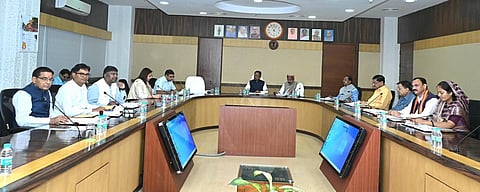

RAIPUR: The Vishnu Deo Sai cabinet on Monday approved the draft and proposal of Chhattisgarh’s new Industrial Development Policy 2024-29.
"The new policy to come into effect from 01 November 2024 and will continue till 31 March 2030 carries the provisions to facilitate the inspiration of Amrit-Kaal Chhattisgarh Vision@2047. The policy has offered various stipulations to establish a new benchmark in the industrial development of the state", said a government spokesperson after the meeting of the council of ministers chaired by the chief minister.
The new Industrial Policy incorporates the Centre’s amendment of the year 2020 that revised the classification of micro, small, medium and large-scale enterprises under the MSME Development Act, 2006, based on their scale, investment limit, nature and turnover.
Special provisions have been laid down in the policy to encourage the industrial growth and balanced development of the state.
To fulfil the goal of the new Industrial Policy, investment incentives will be provided for the setting up of new enterprises, expansion/diversification, replacement and related works in the state.
To accomplish the objective of all-round industrial development across the state, the development blocks of every district will be divided into three sectors and the quantum of industrial investment incentives to be provided are also to be ascertained.
Separate terms have been earmarked for core sector products like steel, cement, thermal power and aluminium. Keeping in view the requirements of the state, they have been divided into thrust and general industries.
Provisions have been made to extend attractive industrial investment impetus for pharmaceutical, textile, food processing, agricultural product preservation, non-timber forest products processing, electronic products, Information Technology and IT-enabled services.
The cabinet also decided to provide reservations in the elections of three-tier Panchayat and urban body elections as per the first report and recommendation of the Other Backward Classes Welfare Commission. Under this, a one-time limit of 25 per cent reservation in local bodies will be relaxed and the reservation will be provided up to a maximum limit of 50 per cent in proportion to the population of Other Backward Classes.